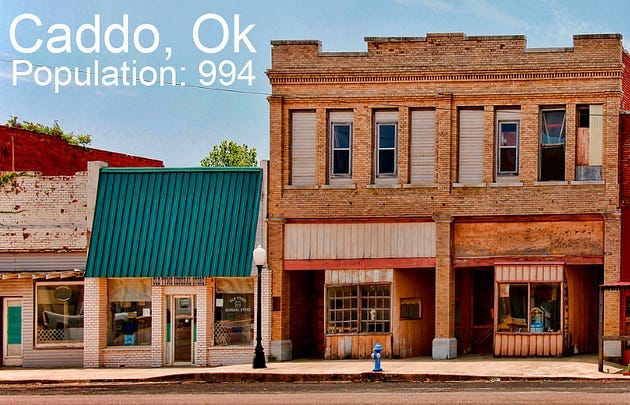(Vision: Caddo, OK) a Small-Town Economic Revival
a How-To that doesn't require government funding
Small town America has been hardest hit by the economy and COVID-19.
Imagine if towns like Caddo, Oklahoma (population: 994) could self-fund their own economic revival.
There’s a lot of towns like Caddo
According to the US Census Bureau, about 76% of the approximately 19,500 incorporated places in the United States have fewer than 5,000 people, of those, almost 42% had fewer than 500 people.
We have an answer, and it’s not “the government,” because they are in over their heads.
What if the citizens of Caddo are on their own? (they are).
Let’s see what happens when we encourage just 10% of Caddo (100 people) to “buy local”
At first, 40 sellers offer their wares within a “buy Caddo first” marketplace, limited to citizens of Caddo, Ok.
It’s fair to assume that each sale would average about $20, and maybe these are meals, local eggs, services, or crafts.
At just 20 sales per month (5 per week), these 40 sellers could bring in about $400/mo in additional household revenue — not bad.
That could help a family prevent involuntary displacement, catch up on bills, or purchase higher-quality produce.
Added together, that’s $192,000/year in “buy local” revenue that’s kept in Caddo, because normally it’s leached away by Amazon, eBay, Walmart, Visa, etc.
Let’s go a step further
Let’s assume that a small local advocacy group is hosting the “buy Caddo first” marketplace, and they are charging a 10% fee per transaction.
By the way: Amazon + Visa charge 18.3% — that’s how we deliver a self-funded economic revival — we cut out the middleman.
Those that participate in “buying Caddo first” end up paying less, earning more, and experiencing less fraud, because they are working with their neighbors.
Let’s talk about that 10% per transaction fee within the marketplace.
Results
The local advocacy group would maintain a community account, and this account would collect about $1,600/mo in transaction-based revenue.
That’s $19,200/year in transaction-based revenue that helps the “buy Caddo first” advocacy group become self-sustaining.
What do the community advocates do with the money?
Let’s assume they decide to do three things:
(1) They encouraged another 100 citizens of Caddo to “buy local”
(2) They taught the first group of sellers how to become more efficient, and now the original group of 40 sellers have doubled their monthly sales (resulting in $800/mo in household income)
(3) They invested in encouraging 25 additional Caddo citizens to sell their goods and services in the Caddo-only marketplace (resulting in $400/mo in household revenue)
Results
The “Buy Caddo First” community activists are now maintaining an account that’s collecting $50,400/year in revenue.
By the way, because the “Buy Caddo First” advocates are providing earn and learn programs as well as vocational opportunities for those who are low-income, they may be able to organize themselves as a formal non-profit entity, meaning they may be able to get away with not paying taxes.
This is how do you do self-governance
Within the prior examples, fewer than 10% of the Caddo population are sellers, and fewer than 20% are buyers, and yet: they are keeping about $550,000 a year inside the Caddo community, instead of leached away into Walmart, Amazon, etc.
What’s next?
At $50,000/year in self-funding, the community activists may choose to invest in “earn and learn” programs that teach some citizens to become food or craft producers.
By becoming a producer, a seller dramatically increases their earning potential.
Our projections suggest a 3x increase, which means that a seller could find they are not only selling to citizens of Caddo, but perhaps they’ve found a market outside the city, to those who live just outside of town.
Why is this good news?
According to the US Census Bureau, 64% of Americans don’t live in towns - 216,000,000 Americans live in unincorporated communities.
They already do most of their business with one another, yet are unduly “taxed” for their use of “convenience” in the form of predatory transaction fees.
The 214 Alpha governance app: my customers keep those fees, and those fees are voted upon by the community.




